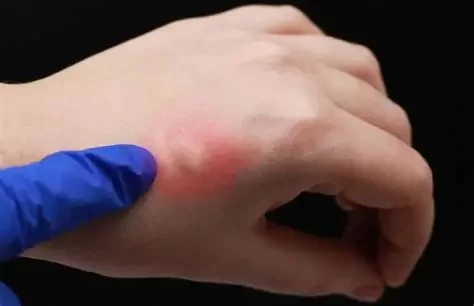Learn how to manage and treat allergic reactions to insect bites. Discover tips for relieving symptoms of mosquito bites, bee stings, and other insect-related allergies.

1- Understanding Allergic Reactions to Insect Bites
Insect bites are a common annoyance, especially during the warmer months. While most bites cause mild discomfort, some people experience allergic reactions that can escalate into more serious health concerns. An allergic reaction occurs when the body's immune system overreacts to the proteins in the insect's saliva or venom. This can result in swelling, itching, pain, and, in extreme cases, more severe complications such as anaphylaxis.
1.1- Common Insects That Cause Allergic Reactions
Several insects can trigger allergic reactions. These include:
- Mosquitoes: The most common cause of allergic reactions due to the proteins in their saliva.
- Bees and Wasps: Known for their stings, these insects can cause intense reactions due to venom injection.
- Ants: Fire ants, in particular, can trigger allergic reactions with their venom.
- Fleas and Ticks: These insects are known for causing skin irritation and sometimes allergic responses, especially in pets.
2- Identifying the Symptoms of an Allergic Reaction to Insect Bites
Recognizing the symptoms of an allergic reaction to insect bites is crucial for timely intervention. While many reactions are mild, others can be severe and require immediate medical attention.
2.1- Mild Reactions
Most insect bites result in minor symptoms such as:
- Redness and swelling at the site of the bite
- Itching or irritation
- A small bump or welt
2.2- Severe Reactions
In some cases, an allergic reaction can become severe, leading to symptoms like:
- Difficulty breathing
- Swelling of the face, lips, or throat
- Rapid heart rate or dizziness
- Nausea or vomiting
- Anaphylaxis, which requires emergency medical care
3- How to Manage and Treat Insect Bite Allergies
Knowing how to treat and manage allergic reactions to insect bites can help alleviate symptoms and prevent complications. Here's how you can deal with mild to moderate reactions:
3.1- Treating Mild Reactions
If the reaction is mild, you can typically manage it at home with the following remedies:
- Cold Compress: Apply a cold compress or ice pack wrapped in a cloth to reduce swelling and discomfort.
- Antihistamines: Over-the-counter antihistamines can help relieve itching and swelling. Make sure to follow the dosage instructions on the label.
- Topical Treatments: Use hydrocortisone creams or calamine lotion to soothe irritation.
- Ointments for Pain Relief: Applying a soothing ointment with aloe vera or hydrocortisone can relieve pain and reduce swelling.
3.2- Dealing with Severe Reactions
If you notice any signs of a severe allergic reaction, such as difficulty breathing, chest tightness, or swelling of the face or throat, it's important to seek medical attention immediately. In some cases, you may need an epinephrine injection (EpiPen) to reverse the reaction.
Always carry an epinephrine auto-injector if you have a known allergy to insect bites, especially if you've experienced a severe reaction before. This device can provide a rapid response to prevent life-threatening symptoms while awaiting emergency help.
4- Prevention Tips to Avoid Allergic Reactions to Insect Bites
While it's not always possible to avoid insect bites, there are several steps you can take to reduce your risk of an allergic reaction:
4.1- Use Insect Repellent
Applying insect repellent to exposed skin can help prevent bites, especially when spending time outdoors in areas with mosquitoes or ticks. Look for products that contain DEET, picaridin, or oil of lemon eucalyptus for effective protection.
4.2- Wear Protective Clothing
Wearing long sleeves, pants, and socks can help protect your skin from bites, especially when hiking or camping in wooded areas where insects are prevalent. Consider wearing light-colored clothing, as insects are more attracted to dark colors.
4.3- Avoid Peak Insect Activity
Insects like mosquitoes are most active during dusk and dawn. Limiting outdoor activity during these times can reduce your chances of being bitten.
4.4- Keep Your Environment Clean
To prevent attracting insects, make sure to keep your home and yard clean. Remove standing water around your home, as this is a common breeding ground for mosquitoes. Also, be sure to maintain your garden and trim overgrown bushes to minimize the risk of ticks and other insects.
5- Conclusion: Be Prepared and Stay Safe
Dealing with allergic reactions to insect bites requires awareness and preparation. By recognizing symptoms early, using effective treatments, and taking preventive measures, you can reduce your risk of severe allergic reactions. Always consult a healthcare professional if you're unsure about how to manage your allergy or if you've had a serious reaction. For more information on managing allergies and staying healthy, visit Pine Cliff Resort for expert advice and recommendations on health and wellness products.
Little John - Camp Ground #1
Victoria, IL 61485, USA
Visit Location PageLazy Frog Campground
75 Cemetery Rd, Lebanon, ME 04027, USA
Visit Location Page